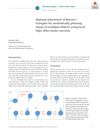 35 citations,
May 1986 in “Clinics in endocrinology and metabolism”
35 citations,
May 1986 in “Clinics in endocrinology and metabolism” The exact cause of increased 5α-reductase activity leading to hirsutism in women is still unknown.
 75 citations,
May 1986 in “Clinics in endocrinology and metabolism”
75 citations,
May 1986 in “Clinics in endocrinology and metabolism” Male hormones are important for hair and oil gland development and can cause conditions like excessive hair growth and acne.
September 2024 in “Journal of Ayurveda and Integrative Medicine” Ayurvedic treatments can improve symptoms and quality of life for systemic sclerosis patients.
 November 2022 in “Journal of the Endocrine Society”
November 2022 in “Journal of the Endocrine Society” A woman's masculine features were caused by a rare ovarian tumor that produced male hormones.
 December 2022 in “International Journal of Women's Dermatology”
December 2022 in “International Journal of Women's Dermatology” The Sinclair Shedding Scale is effective for diagnosing Alopecia Areata Incognita and monitoring treatment success.
5 citations,
February 2017 in “Cochrane library” There is not enough evidence to know if different ways of putting in eye drops for glaucoma work better than others.
 87 citations,
March 2014 in “Biochimica et Biophysica Acta (BBA) - Molecular and Cell Biology of Lipids”
87 citations,
March 2014 in “Biochimica et Biophysica Acta (BBA) - Molecular and Cell Biology of Lipids” Cholesterol sulfate buildup due to a genetic mutation disrupts the skin barrier, leading to the scaling skin seen in X-linked ichthyosis.
 3 citations,
July 2004 in “SKINmed/Skinmed”
3 citations,
July 2004 in “SKINmed/Skinmed” A 4-year-old girl was diagnosed with erythrokeratodermia variabilis after other treatments failed.

The text is about acne, excessive hair growth, and hair loss due to hormones.
 3 citations,
August 2018 in “Journal der Deutschen Dermatologischen Gesellschaft”
3 citations,
August 2018 in “Journal der Deutschen Dermatologischen Gesellschaft” The technique effectively repairs skin after tumor removal, maintaining appearance and function without complications.
19 citations,
October 2021 in “Nano letters” Gold nanoparticles can safely and effectively treat psoriasis without drugs and have no major side effects.
 22 citations,
February 2010 in “The Veterinary clinics of North America. Small animal practice/Veterinary clinics of North America. Small animal practice”
22 citations,
February 2010 in “The Veterinary clinics of North America. Small animal practice/Veterinary clinics of North America. Small animal practice” The cause of atypical Cushing's syndrome in dogs, possibly linked to sex hormones, is not yet proven.
3 citations,
March 2022 in “Transgender Health” More research is needed to improve lower body gender affirmation techniques.

Antioxidant therapy, especially with selenium, can improve skin aging in patients with Metabolic Syndrome.
 24 citations,
January 2013 in “Indian Journal of Dermatology, Venereology and Leprology”
24 citations,
January 2013 in “Indian Journal of Dermatology, Venereology and Leprology” Hormonal treatment is effective for women with acne not helped by usual treatments, especially if they have hormonal imbalances.
6 citations,
January 2011 in “Oral and maxillofacial surgery clinics of North America” Secondary facelifts or neck lifts should focus on deep layer support rather than just tightening skin for a natural look.
 April 2024 in “Skin appendage disorders”
April 2024 in “Skin appendage disorders” Environmental pollutants can damage hair health and cause hair loss.
January 2013 in “Obstetrical & gynecological survey” Most women with hirsutism have normal hormone levels and can be treated with cosmetic methods; obesity and PCOS are common causes, and treatments depend on the underlying issue.
 1 citations,
August 2012 in “Journal der Deutschen Dermatologischen Gesellschaft”
1 citations,
August 2012 in “Journal der Deutschen Dermatologischen Gesellschaft” A woman's hyperandrogenism was caused by a genetic mutation leading to non-classic adrenogenital syndrome.
 5 citations,
April 2011 in “The Lancet”
5 citations,
April 2011 in “The Lancet” Untreated congenital adrenal hyperplasia can lead to complications like stroke and needs glucocorticoid treatment.
 43 citations,
January 1977 in “Toxicology and Applied Pharmacology”
43 citations,
January 1977 in “Toxicology and Applied Pharmacology” Minoxidil is mostly safe, but high doses can cause electrolyte imbalances and heart issues in dogs.
 7 citations,
September 2018 in “Aesthetic surgery journal”
7 citations,
September 2018 in “Aesthetic surgery journal” Deoxycholic acid effectively reduces double chin fat with temporary side effects and high patient satisfaction.
 86 citations,
July 2002 in “Clinical and Experimental Dermatology”
86 citations,
July 2002 in “Clinical and Experimental Dermatology” FPHL is a common, age-related, genetic hair loss with unclear causes and limited treatment options.
 1 citations,
July 2019 in “The journal of applied laboratory medicine”
1 citations,
July 2019 in “The journal of applied laboratory medicine” Venous catheterization may help diagnose the cause of female hyperandrogenism when imaging is unclear.
 7 citations,
August 2023 in “EClinicalMedicine”
7 citations,
August 2023 in “EClinicalMedicine” Anti-androgens can help manage some PCOS symptoms better than metformin but are not more effective than placebos or birth control pills for other symptoms.
115 citations,
March 2001 in “Baillière's best practice and research in clinical endocrinology and metabolism/Baillière's best practice & research. Clinical endocrinology & metabolism” Key enzymes control androgen levels, affecting hormone activity and potential treatments.
17 citations,
November 2010 in “Perspectives on Psychological Science” Feeling younger can improve health and extend life.
 9 citations,
January 2001 in “Dermatology”
9 citations,
January 2001 in “Dermatology” Pili anulati may cause hair loss, proper diagnosis and treatment needed.
28 citations,
January 2017 in “Obstetrician & gynaecologist/The obstetrician & gynaecologist” The document concludes that managing PCOS effectively requires considering ethnic differences, obesity's impact, and ethical concerns in treatment approaches.
 6 citations,
July 2016 in “Gynecological Endocrinology”
6 citations,
July 2016 in “Gynecological Endocrinology” PSA levels are higher in women with PCOS, but FAI is a more accurate marker for diagnosis.





















